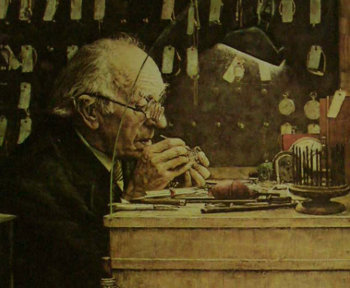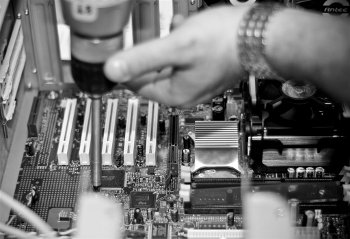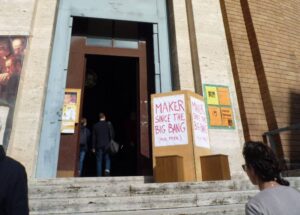I spent some time today thinking about a Slashdot article bemoaning the demise of the gadget fixer. In my generation, he was the guy who repaired my television. And yes Virginia, there really were people who fixed televisions. No, not taking them to recycle…I mean really repairing them so they could be used again. The same went for toasters, refrigerators and dishwashers. We had a guy in town who even fixed our radios.
There is no doubt that we live in a throwaway society. We see it most every recycle day throughout our streets and neighborhoods. Flat screen monitors, computers…even appliances that cost hundreds of dollars. Standing stoically, awaiting their fate to be crushed and sold for scrap.
 If the fact be known, my nonprofit prospers greatly from this 21st century attitude. I should say, the kids who receive computers from my nonprofit prosper. 60 percent of the stuff we get as donations are in good shape. The only thing wrong with them is that the owner wanted something new. We’re to the point where the donated desktops are solid core duos with at least 4 gigs of RAM. Two years ago, I would have done dirty deeds dirt cheap to get donations like that. But what we are receiving now is just fine.
If the fact be known, my nonprofit prospers greatly from this 21st century attitude. I should say, the kids who receive computers from my nonprofit prosper. 60 percent of the stuff we get as donations are in good shape. The only thing wrong with them is that the owner wanted something new. We’re to the point where the donated desktops are solid core duos with at least 4 gigs of RAM. Two years ago, I would have done dirty deeds dirt cheap to get donations like that. But what we are receiving now is just fine.
So, what about the other 40 percent of the stuff we receive? Do we fix those? You can bet we do…the ones that are cost effective to fix anyway. Now, when we get that stretch of mid 2000 Dells with the swollen and bursting capacitors, no; those are cannibalized for parts and the rest goes to recycle. But those are getting fewer and further in between.
The first time I opened a computer I was a bit intimidated. So many components that do so many things. So many failures that could be attributed to so many other reasons or components. As it is with most things though, once you dive in and get wet, the water isn’t that bad. And neither is repairing a computer.
This fall, I was humbled by a gentleman who traveled many miles to get to Ohio LinuxFest 2014. His sole reason to be there was to introduce me as the closing keynote. I didn’t know a thing about this until the speaker chairman for the conference, Vance Kochenderfer, asked if it would be okay for him to give my intro. Of course, I said it would be fine.
He referred to me as “a fixer.” That’s a term we don’t hear much these days. I take my job of “fixing” in stride, and maybe with an equal amount of pride. But I’m not talking about just the physical fixing of things like computers or clock radios. I am also a fixer of attitudes and beliefs. I strive to repair the dream…the idea that young people can do anything they truly want to do.
Many of the kids we help at Reglue are from, uh…unfulfilling environments, whether that’s a home with no stability or a foster environment where the kid feels that he or she is nothing but a pair of shoes with a monthly subsidy payment stapled to them. And more than once, we’ve been the catalyst for having an abused or neglected child removed from an unstable or abusive environment. One needs to tread carefully when bringing about this sort of change, but fortunately, we’ve batted a thousand in our interventions.
But that’s not the end of the story between those kids and Reglue, which is my real point. We have summer clinics and activities specifically for those kids. I mean, we’ve intervened in their lives already; it’s nothing short of our duty to help them achieve their dreams in any small way we can.
 In the past four years, we’ve had over 100 of these kids march through our facility at Reglue, taking part in everything from our girlzRGeekz2 girl mentoring program to the HeliOS Project computer camps we hold during the summer. What we are doing is preparing a new generation of fixers…and don’t you doubt for one minute that they are anything less.
In the past four years, we’ve had over 100 of these kids march through our facility at Reglue, taking part in everything from our girlzRGeekz2 girl mentoring program to the HeliOS Project computer camps we hold during the summer. What we are doing is preparing a new generation of fixers…and don’t you doubt for one minute that they are anything less.
Some of these young people go on to earn computer science or engineering degrees. They go forward schooled in “the old ways.” We’ve taught them that some things do not need to be thrown away. That someone out there can use what they fix…if only they take the time to fix it.
So no, I’m not going to nod my head in agreement with some academic’s wringing of hands, worried that the latest generation is not appreciating the things that can be fixed. There are fixers in any generation. There are people who see beyond burned wires and bent metal. They see past the the twisted frame and broken glass.
Some people know what to do with that stuff, and they will continue to repair, replenish and re-purpose things of value. I believe it’s an inherent part within many of us. Maybe the professor is just looking in the wrong places. Maybe he or she is looking at statistics instead of shoes on the ground and hands that are cut up and bleeding from pulling a power supply.
Maybe this professor needs to spend a week at my shop.
Ken Starks is the founder of the Helios Project and Reglue, which for 20 years provided refurbished older computers running Linux to disadvantaged school kids, as well as providing digital help for senior citizens, in the Austin, Texas area. He was a columnist for FOSS Force from 2013-2016, and remains part of our family. Follow him on Twitter: @Reglue







Fixers and makers learn not to accept the world as it is, but rather to make the world into what they want.
One thing that bothers me is the very real shift towards not just difficult to fix things, but things deliberately designed to become useless because end user modification is prevented. Apple is perhaps the king of this disturbing trend.
Take for instance an older iPod touch. Not only have they been left behind by Apple’s march of ever…er, um “better”…iOS versions, but Apple has deliberately created an environment where they become less useful over time. When apps on the app store get upgraded to newer iOS versions, they often drop support for older versions. While developers can’t be expected to support everything forever, the real problem comes when you backup and restore a device. Apple simply makes no provision for restoring older app versions, meaning an older iOS device can’t reinstall those older apps which were working perfectly before the restore, rendering any backup of your apps pointless.
Apple is for people who want to be told how the world is, rather than shape it.
Microsoft is following Apple’s hardware lead with its Surface products and its forced incorporation of EUFI Secure Boot, however most PCs and laptops are eminently fixable.
I used to build my own PCs, but lately I’ve “saved” some 2008-2009 vintage throw-offs that I got for free. Depending on item, they needed some RAM, hard drives, or a power supply, some of which I had on hand. For very little investment I have a Xeon workstation, an i7 PC, and a Core2Quad PC with built-in wireless-N! These were all saves from the scrap heap! I’ve long thought that we should recycle old PCs for a type of shop class or club in schools, where kids can work on PCs without restriction, learn OS installation, and maybe move into some programming/engineering on the old machines.
Unfortunately, what’s making some otherwise fixable devices unusable are OS upgrades with obsolescence built-in, as Mike’s post describes.
I fix things. I have been fixing or helping to fix things for over 48 of my 55 years of life. I just replaced the fan in one of my laptops…not the fan/heatsink assembly, but the fan itself. This was far from my first time fixing laptop and desktop computers. I have fixed many electronic, electrical, and mechanical devices over the years. Linux helps with the “need new hardware to keep up with the latest OS” crap. In the last couple of days I got 3 computers running Linux Mint 17 (KDE) to work with Chrome so that they can be used to watch Netflix. One more reason not to need an OS that wants me to pay for upgrades, and to upgrade my hgardware at the same time.
I do more with my computers than most people, and I don’t need the latest hardware. I CAN run an up-to-date OS thanks to GNU/Linux. My computers are all 4-6 years old and suffice for me as they would for 80% of computer users out there. And I can remember the days when you turned on the computer, then went and cooked and ate breakfast, and by then the computer was almost done booting up…the days when if you had a 10 Megabyte (not gigabyte, but megabyte) hard drive that was considered huge.
Ken, you’re really a fixer, but not a PC fixer.
You fix what’s more important — the kids and their ability to dream for a better world. Who knows what one of them might become? From such humble beginnings many great men started — and specially great women, because they impact the world more than men.
In this modern world of ours, you give them eyes to see, ears with which to hear and power to message others and learn.
That’s great fixing, probably the best: fixing people before they suffer more and end up breaking, which can be as bad as beyond repair.
Just keep doing it, ok?
Best wishes for 2015!
Ken: I’m holding my breath for your recovery from your surgery on Jan 16, which I learned about over at your blog.
On the current topic, I want to point out that the lessons you have learned by working with computers, while applied only to computers here, have nothing to do with computers. Or even electrical devices or appliances. They are universal lessons, for every single commodity and product produced by this maximally wasteful society. I learned about them by starting a company for reusing all of the chemicals being discarded in the SF Bay Area, including every single chemical produced as an excess in Silicon Valley. I distilled my knowledge into a book called Getting To Zero Waste and into a website at http://www.zerowasteinstitute.org. You are doing the same thing now.
What I learned is that the key is not working with the degraded designs shoveled out by manufacturers which were DESIGNED from scratch to quickly fail, but to go back into the design phase of ALL PRODUCTS and change the mission from design for the dump to design for perpetual reuse. So long as you are trying to fix something that was designed to be unfixable, you will never truly succeed.
All of us, in our corners of the world of commodities, need to join together and not remain isolated. The products we focus on are not fundamental, but the social and commercial understandings are universal. I invite everyone reading this to join me at my website and then join in organizing a truly essential environmental organization, with untold implications like moderating climate change, but which the garbage suffused society we inhabit is trying to ignore. A gathering, a syllabus, some courses, directed research and some activism for change is the natural outcome that I hope for.